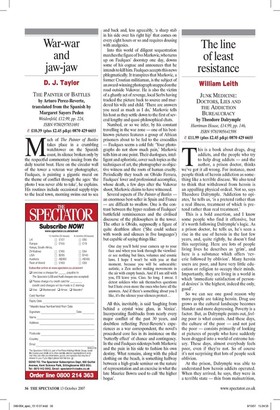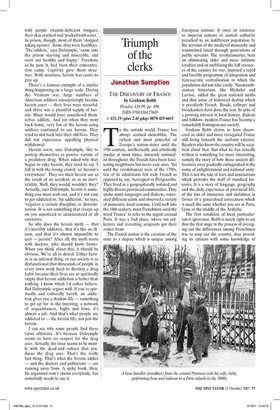The line of least resistance
William Leith JUNK MEDICINE: DOCTORS, LIES AND THE ADDICTION BUREAUCRACY by Theodore Dalrymple Harriman House, £14.99, pp. 146, ISBN 9781905641598 © £11.99 (plus £2.45 p&p) 0870 429 6655 This is a book about drugs, drug addicts, and the people who try to help drug addicts — and the author, a prison doctor, thinks we've got it all wrong. For instance, most people think of heroin addiction as something like a terrible disease. We also tend to think that withdrawal from heroin is an appalling physical ordeal. Not so, says Theodore Dalrymple. 'Addiction to opiates,' he tells us, 'is a pretend rather than a real illness, treatment of which is pretend rather than real treatment.'
This is a bold assertion, and I know some people who find it offensive, but it's worth following Dalrymple's logic. As a prison doctor, he tells us, he's seen a rise in the use of heroin in the last few years, and, quite rightly, he doesn't find this surprising. Here are lots of people living lives he describes as 'grim', and here is a substance which offers 'reverie followed by oblivion'. Many heroin users are poor, and have very little education or religion to occupy their minds. Importantly, they are living in a world in which 'immediate satisfaction of personal desires' is 'the highest, indeed the only, good'.
So we can see one good reason why more people are taking heroin. Drug use grows as the cultural landscape becomes blander and more depressing. Poverty is a factor. But, as Dalrymple points out, feeling poor is what counts. And these days, the culture of the poor — and not just the poor — consists primarily of looking at pictures of people who have suddenly been dragged into a world of extreme luxury. These days, almost everybody feels poor, even if they're not. So of course it's not surprising that lots of people seek oblivion.
At the prison, Dalrymple was able to understand how heroin addicts operated. When they arrived, he says, they were in a terrible state — thin from malnutrition, with purple vitamin-deficient tongues, their skin cracked and 'pocked with sores.' In prison, though, most of them 'stopped taking opiates'. Soon, they were healthier. 'The addicts,' says Dalrymple, 'came into the prison starving and miserable, and went out healthy and happy.' Freedom, as he puts it, had been their concentration camp. Captivity gave them structure. With structure, heroin was easier to give up.
There's a famous example of a similar thing happening on a large scale. During the Vietnam war, large numbers of American soldiers unsurprisingly became heroin users — their lives were stressful, and there was a plentiful supply of heroin. Many would have considered themselves addicts. And yet when they went back home, very few of the heroin-using soldiers continued to use heroin. They tried to slot back into their old lives. They did not experience appalling physical withdrawal.
Heroin users, says Dalrymple, like to portray themselves as passive victims of a predatory drug. When asked why they began to take heroin, they tend to say 'I fell in with the wrong crowd,' or 'heroin's everywhere'. They see their heroin use as the result of an accident, or as an inevitability. Well, they would, wouldn't they? Actually, says Dalrymple, heroin is something you must seek out, and it's not easy to get addicted to. 'An addiction,' he says, 'requires a certain discipline or determination. It is not something that creeps up on you unnoticed or unannounced or all unawares.'
So why does the heroin myth — that it's horribly addictive, that it's like an illness, and that it's almost impossible to quit — persist? After all, the myth starts with doctors, who should know better. When you think about this, it should be obvious. We're all in denial. Either heroin is an infernal thing, or our society is so dysfunctional that thousands of people in every town work hard to develop a drug habit because their lives are so spiritually empty that heroin addiction is better than nothing. I know which I'd rather believe. But Dalrymple argues well. If you're spiritually and culturally bereft, an addiction gives you a shadow-life — something to get up for in the morning, a network of acquaintances, highs and lows; it's almost a job. And that's what people are addicted to — the heroin life, not just the heroin.
I can see why some people find these views offensive. It's because Dalrymple seems to have no respect for the drug user. Actually, his issue seems to be mostly with the dead-end culture that produces the drug user. That's the really bad thing. That's what the heroin addict — and the doctors and politicians — are running away from. A spiky book, then. Its argument won't charm everybody, but somebody needs to say it.




































































 Previous page
Previous page